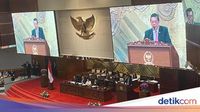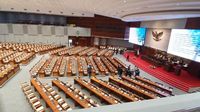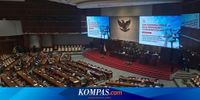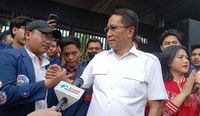On March 20, 2025, a significant legislative event unfolded in Jakarta as the Dewan Perwakilan Rakyat (DPR) officially ratified the revision of Law Number 34 of 2004 concerning the Indonesian National Army (TNI) into law. This decision was the culmination of a process marked by both political dialogue and public dissent.
The pivotal session took place at the DPR building in Senayan, Jakarta, led by Speaker Puan Maharani. During the plenary meeting, held at 09:30 WIB, various government officials were present, including Minister of Defense Sjafrie Sjamsoeddin and TNI Commander General Agus Subiyanto. It was a gathering that underscored the significance of the occasion, highlighting the governmental support for the revised law.
Factions within the DPR overwhelmingly endorsed the revision, with all members expressing agreement when prompted by Puan: “Kami menanyakan kepada seluruh anggota apakah Rancangan Undang-Undang tentang Perubahan atas Undang-Undang Nomor 34 Tahun 2004 tentang Tentara Nasional Indonesia, apakah dapat disetujui untuk disahkan menjadi undang-undang?” to which members replied unanimously, “Setuju.”
However, the passage of the RUU TNI has not been without controversy. It was met with strong opposition from various segments of society, including students, academics, and civil society groups, who voiced their concerns regarding the implications that the revised law could have on civilian supremacy and democracy in Indonesia. Critics have termed the RUU TNI dangerous, citing fears of a dual-function military that could undermine the principles of civilian governance.
Prior to its ratification, a noteworthy dialogue occurred on March 19, 2025, between Minister of Law Supratman Andi Agtas and student leaders from Trisakti University. This meeting, which lasted around 15 minutes, was held outside the DPR building and revolved around the students’ rejection of the RUU TNI. During this exchange, Agtas expressed his willingness to relay the students' concerns to both the government and the DPR leadership. He stated, “Saya akhirnya bisa bertemu dengan teman-teman presiden mahasiswa dan seluruh anggota mahasiswa Universitas Trisakti. Semua tuntutan terkait dengan pembahasan rancangan Undang-Undang Tentara Nasional Indonesia saya sudah dengar.”
Moreover, Agtas noted that the students’ worries about the potential reemergence of military dualism could be addressed, hinting at a possibility for careful consideration of their concerns within the government. “Tuntutan (mahasiswa) supaya (RUU TNI) tidak dilanjutkan, kelihatannya mungkin karena belum melihat materi perubahan, khawatirnya ada dwifungsi ABRI, dwifungsi TNI, soalnya kan jauh,” he remarked, reflecting on the prevailing sentiments surrounding the legislation.
On the day of the law’s ratification, Utut Adianto, the Chairman of Commission I of the DPR, spoke fervently about the newly revised law's intended benefits. In his speech, he emphasized the positive impact it could have for both the nation and the state, saying, “Pengesahan rancangan undang-undang tentang perubahan atas undang-undang Nomor 34 Tahun 2004 tentang Tentara Nasional Indonesia pengesahan undang-undang ini diharapkan dapat memberikan manfaat besar bagi bangsa dan negara.” Adianto affirmed that the revisions included specific amendments to four articles addressing critical components such as the TNI's position and the ages of retirement for soldiers.
Notably, the articles altered include Article 3 regarding the TNI's positioning, Article 15 concerning the main tasks of the military, Article 53 concerning retirement ages, and Article 47 related to the placement of active soldiers in civilian roles. This legislative change seeks to demonstrate modern governance while maintaining military structure.
While the DPR moves forward with its plans for military governance reform, public reaction remains mixed. Many, like Nuryanti Widyastuti, Head of the Regional Office of the Ministry of Law and Human Rights in South Kalimantan, praised Agtas' outreach efforts to engage the youth. She conveyed that open communication with society is an essential facet of a healthy democratic process. “Sikap terbuka dalam mendengarkan aspirasi masyarakat, khususnya generasi muda, adalah bagian penting dari proses demokrasi yang sehat,” stated Widyastuti.
Officials within the DPR, however, have maintained that these reforms are designed to enhance civilian oversight of military functions, an assertion met with skepticism from those concerned about potential military overreach. The balance between reforming military laws while upholding democratic principles remains a contentious topic in Indonesian politics.
As this situation develops, it serves as a crucial point of reflection for Indonesia, navigating the complex interplay of governance, public opinion, and military power, ultimately shaping the future of civilian oversight in the Archipelago.







